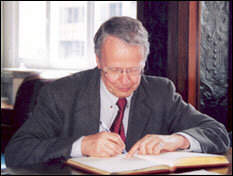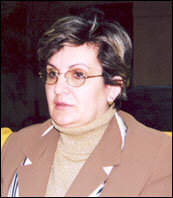 TELECOMUNICATIONS TELECOMUNICATIONS |
Before the conflict, Kosovo was at the bottom of the list in terms of telephone penetration rates in Europe, with about six lines for every 100 people. Very little investments were made in the sector throughout the 1990s and much of the network equipment is obsolete or is not functioning. The destruction of the telephone fixed lines during the war was extensive. The overall Telecommunications infrastructure suffered heavy damage during the conflict and there was little or no maintenance due to the lack of necessary operating equipment and vehicles to service faulty stations. Many facilities were completely destroyed including the main transmission center in Prishtina, a backbone switch for more than10,000 subscribers within Kosovo.

DSRSG Mr. Tom Koenigs head of Pillar II
Post and Telecom of Kosova (PTK) was established in 1999 by the UNMIK administration. Its main objective has been to manage the property of the previous public enterprise PTT, in order to secure basic phone services for the population of Kosovo. By the end of the year 1999, UNMIK and PTK signed a contract "key in hand" with Monaco Telecom, for providing GSM mobile phone services, with a network that covers the largest part of the Kosovo territory. According to UNMIK official, DSRSG Mr. Tom Koenigs head of Pillar II, the license was granted to Monaco Telecom and not Siemens to "circumvente the problem of the national code. Since this is not a state, we couldn't get the national code without the consent of Belgrade, so telephonically we are a part of Monaco which has the same country code." This however leaves Kosovo with the same code of Monaco and not a code for its territory alone.
Further putting into question the real motives of granting the license to Monaco Telecom as opposed to the proposed Siemens offer, which would have meant lower cost for consumers and a true country code for Kosovo.
PTK has been given the authority to provide post
and telecommunication services on a provisional
basis, using the existing public postal and telecommunication
assets of PTT. However, many towns are still to
be reconnected to the national network. The Swiss
Government provided DM 0.4 million worth of essential
tools to enable PTK to resume operations. PTK has
also been able to restore a minimal microwave network
linking major local towns. Long distance and international
telephone services are now available in major city
centers but they lack quality and reliability. According
to the General Director Ms. Leme Xhema, Post and
Telecom of Kosovo (PTK) "It is the only post
and telecommunications service provider on the territory
of Kosovo, apart from PTT in Serbia; it also offers
mobile telephone and Internet connections to its
clients here". |
At present there is little competition within the Telecommunication's sector of Kosovo. Naturally, PTK, which owns the mobile operator Vala 900 has experienced incredible growth since the end of the conflict. Ms. Leme Xhema of PTK says that, with "Vala 900 we have reached an 80% coverage of the territory, all main cities are covered including main roads also. We have 200,000 subscribers. Our capacities allow us to have 400,000, and we are also working in the improvement of our services, we plan to put another 120 bases into work". Kosovo has one other mobile network service operator with the name of Mobtel that comes from Serbia . Officials at PTK call it illegal, while the heads of UNMIK say that it has a license for a period of 20 years. Mobtel was granted its license in 1996 when 49% of the shares of Serb Telecom were sold to a Greek and Italian Company. But no matter the legal or illegal status of Mobtel. Mobtel cannot represent threatening competition for PTK, because the percentage of the population that uses their service is very small. From the previous 100% of the market that it use to posses, its share has now shrunk to less than 5% of the market.

Mrs. Leme Xhema CEO of PTK
By the beginning of 2002, PTK started providing Internet access services through linking points in Macedonia and Albania. PTK´s Internet service provider called Dardanet has experienced steady growth of its regular user base. Currently, PTK employs between 1800 to 1900 staff members who work in Post and Telecommunication departments. It has approximately 140.000 subscribers for its fixed phone line services, and 160.000 subscribers for mobile communication services. Approximately 7% of the population has access to static phone lines, while in rural areas this figure is less than 1%. The annual income of PTK for 2001 was estimated to be between 160-350 million Euros. Since the beginning of operations in 1999, PTK has reinvested more than 250 million DM in restructuring and improving the regions telephone networks.
Despite, the success of PTK, Mrs. Leme Xhema admits, that the company "cannot develop as fast as we would like to, because of the lack of legal framework, this has to be created first by the Assembly and the newly appointed Ministries". She further adds, "Kosovo is a great market, both in the aspect of telecommunications and postal services (…) the liberalization of the market will definitely bring us new solutions". |

